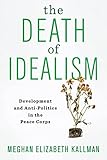The Death of Idealism : Development and Anti-Politics in the Peace Corps / Meghan Elizabeth Kallman.
Material type: TextPublisher: New York, NY : Columbia University Press, [2020]Copyright date: ©2020Description: 1 online resource : 15 b&w illustrationsContent type:
TextPublisher: New York, NY : Columbia University Press, [2020]Copyright date: ©2020Description: 1 online resource : 15 b&w illustrationsContent type: - 9780231189682
- 9780231548465
- 361.6 23
- online - DeGruyter
| Item type | Current library | Call number | URL | Status | Notes | Barcode | |
|---|---|---|---|---|---|---|---|
 eBook
eBook
|
Biblioteca "Angelicum" Pont. Univ. S.Tommaso d'Aquino Nuvola online | online - DeGruyter (Browse shelf(Opens below)) | Online access | Not for loan (Accesso limitato) | Accesso per gli utenti autorizzati / Access for authorized users | (dgr)9780231548465 |
Browsing Biblioteca "Angelicum" Pont. Univ. S.Tommaso d'Aquino shelves, Shelving location: Nuvola online Close shelf browser (Hides shelf browser)

|

|

|

|

|

|

|
||
| online - DeGruyter Lacan : Anti-Philosophy 3 / | online - DeGruyter Why Trust Matters : An Economist's Guide to the Ties That Bind Us / | online - DeGruyter Nikolai Nikolaevich and Camouflage : Two Novels / | online - DeGruyter The Death of Idealism : Development and Anti-Politics in the Peace Corps / | online - DeGruyter Threatening Property : Race, Class, and Campaigns to Legislate Jim Crow Neighborhoods / | online - DeGruyter Fandango and Other Stories / | online - DeGruyter Woe from Wit : A Verse Comedy in Four Acts / |
Frontmatter -- CONTENTS -- ACKNOWLEDGMENTS -- INTRODUCTION -- 1. THE PEACE CORPS AND ITS VOLUNTEERS -- 2. THE DEVELOPMENT OF DEVELOPMENT -- 3. ETHICAL AND PROCEDURAL PROFESSIONALIZATION AMONG PEACE CORPS STAFF -- 4. VOLUNTEERS IN THE FIELD -- 5. HOME AGAIN: Political, Civic, and Occupational Consequences of Volunteering -- CONCLUSION -- Appendix: Book Methodology -- Notes -- Index
restricted access online access with authorization star
http://purl.org/coar/access_right/c_16ec
Peace Corps volunteers seem to exemplify the desire to make the world a better place. Yet despite being one of history’s clearest cases of organized idealism, the Peace Corps has, in practice, ended up cultivating very different outcomes among its volunteers. By the time they return from the Peace Corps, volunteers exhibit surprising shifts in their political and professional consciousness. Rather than developing a systemic perspective on development and poverty, they tend instead to focus on individual behavior; they see professions as the only legitimate source of political and social power. They have lost their idealism, and their convictions and beliefs have been reshaped along the way.The Death of Idealism uses the case of the Peace Corps to explain why and how participation in a bureaucratic organization changes people’s ideals and politics. Meghan Elizabeth Kallman offers an innovative institutional analysis of the role of idealism in development organizations. She details the combination of social forces and organizational pressures that depoliticizes Peace Corps volunteers, channels their idealism toward professionalization, and leads to cynicism or disengagement. Kallman sheds light on the structural reasons for the persistent failure of development organizations and the consequences for the people involved. Based on interviews with over 140 current and returned Peace Corps volunteers, field observations, and a large-scale survey, this deeply researched, theoretically rigorous book offers a novel perspective on how people lose their idealism, and why that matters.
Mode of access: Internet via World Wide Web.
In English.
Description based on online resource; title from PDF title page (publisher's Web site, viewed 27. Jan 2023)


